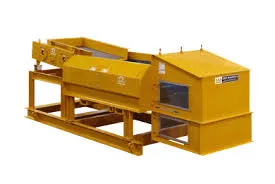

Nov . 18, 2024 09:53 Back to list
The Importance of Plastic and Metal Shredders in Recycling
In today's world, the rise of consumerism has led to an alarming increase in waste generation, including plastics and metals. As these materials dominate landfills and contribute to environmental pollution, the need for effective recycling systems has become more critical than ever. One of the most pivotal players in the recycling industry is the plastic and metal shredder. These machines are essential for breaking down waste materials into manageable sizes, making them suitable for various recycling processes.
Plastic and metal shredders are powerful machines designed to cut and fracture large pieces of plastic and metal into smaller fragments. This shredding process is essential for several reasons it not only facilitates easier handling and transportation but also enhances the efficiency of recycling. By reducing the size of waste materials, shredders help create a uniform material that can be processed more easily by other recycling equipment, such as granulators or crushers.
The shredding process begins with the collection of waste materials, which can consist of discarded plastic bottles, containers, metal scraps, or industrial byproducts. Once collected, these materials are fed into the shredder, where sharp blades and high-torque motors work together to chop them into smaller pieces. Depending on the design and purpose of the shredder, the output size can be adjusted to meet specific recycling requirements. This versatility makes shredders indispensable in both small-scale recycling facilities and large industrial operations.
After the initial shredding, the processed materials can undergo further separation and purification. For plastics, this may involve sorting different types of polymers, as various plastic materials have distinct properties and recycling processes. Metals, on the other hand, can be sorted based on their conductivity and other characteristics. Shredding enhances the sorting process by increasing the surface area of the materials, allowing for more efficient separation using methods like air classification or magnetic separation.

Moreover, recycling through shredding plays a significant role in reducing environmental impact. By recycling and reprocessing plastic and metal, we can significantly decrease the demand for virgin materials, which often require extensive energy and resources to extract and process. This not only conserves natural resources but also reduces greenhouse gas emissions associated with material production. In fact, recycling plastic can save up to 80% of the energy needed to produce new plastic from raw materials, while metal recycling can lead to energy savings of up to 75%.
In addition to environmental benefits, plastic and metal shredders also have a considerable economic impact. The recycling industry creates jobs and fosters innovation in waste management technologies. By investing in shredding and recycling infrastructure, communities can stimulate local economies while promoting sustainability. Furthermore, with the increasing focus on circular economies, businesses are encouraged to implement strategies that recycle materials back into production processes, closing the loop and minimizing waste.
As we continue to grapple with waste management issues and the depletion of natural resources, the role of plastic and metal shredders will only become more critical. Innovations in shredding technology are helping to improve efficiency, reduce operational costs, and minimize energy consumption. Embracing these advancements will further encourage the recycling ecosystem, ensuring that materials are repurposed effectively and responsibly.
In conclusion, plastic and metal shredders are vital components of the recycling industry. They facilitate the efficient processing of waste materials, promote environmentally sustainable practices, and stimulate economic growth. As we move towards a greener future, investing in advanced shredding technology and recycling infrastructure is not just beneficial—it is essential. The time to act is now, and shredders will play a pivotal role in shaping a more sustainable world for generations to come.
Latest news
Troubleshooting Common Eddy Separator Problems
NewsJul.04,2025
The Role of Metal Recycling Plants in Circular Economy
NewsJul.04,2025
The Impact of Recycling Line Pickers on Waste Management Costs
NewsJul.04,2025
Safety Features Every Metal Shredder Should Have
NewsJul.04,2025
How Industrial Shredders Improve Waste Management Systems
NewsJul.04,2025
How Cable Granulators Contribute to Sustainable Recycling
NewsJul.04,2025